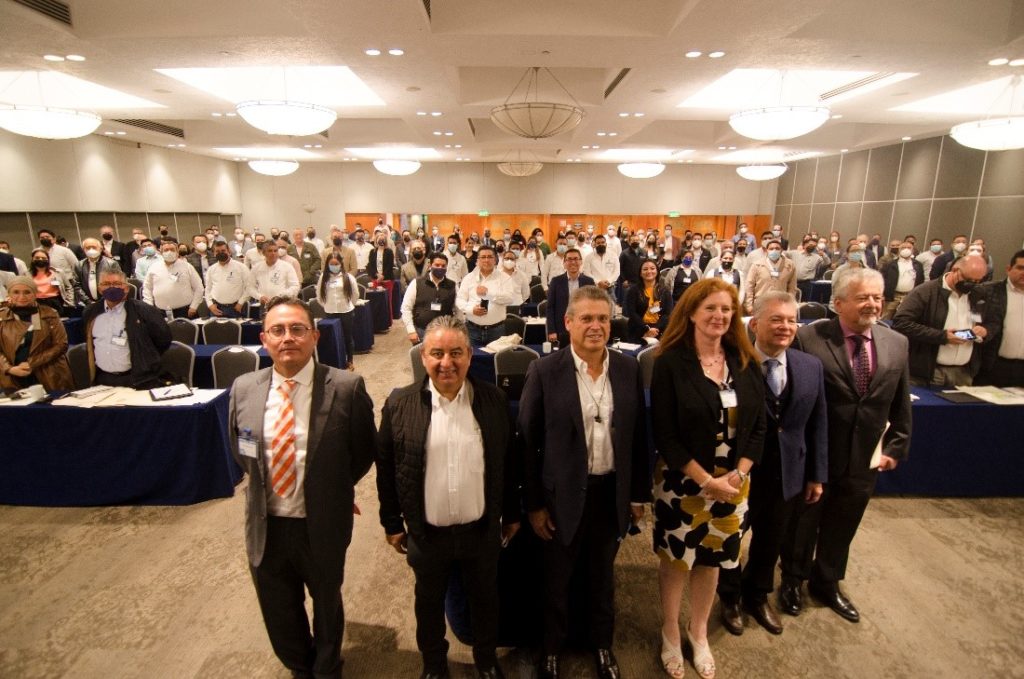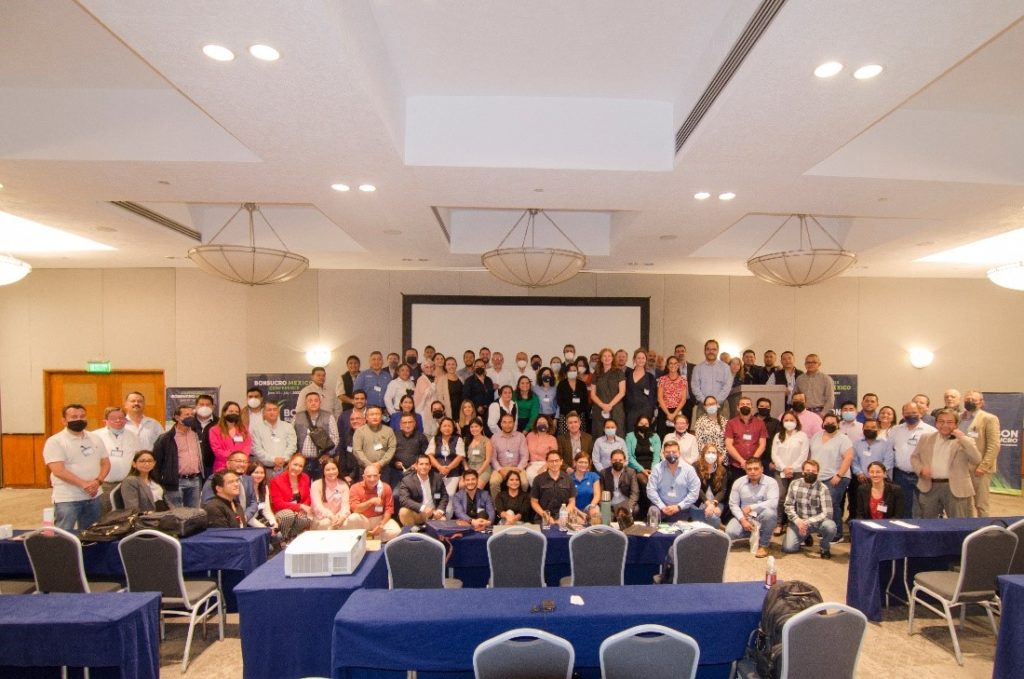7th July 2022
Lee en español aquí
We recently hosted our first in-person event since the pandemic. Conferencia Bonsucro Mexico brought together representatives from the Mexican Government, mills, farmers, traders, NGOs and brands. There were more than 170 attendees from México, Nicaragua, United States, Colombia, El Salvador, Canada, United Kingdom, Guatemala, Brazil, Costa Rica and Honduras.

As our CEO, Danielle Morley said, “We are now at the very edge of planetary boundaries, and already starting to experience the impacts of climate change, biodiversity loss, and ecosystem collapse.” This means that “sustainability is no longer a nice to have as an option – it is now a core business risk.” For that reason, we hosted the conference to create a space for our members with an interest in Mexico to come together. The event also enabled us to share details on our new Production Standard, talk about our Smallholder Standard, and offer details on our work to drive market uptake.
The Mexican market
Mexico is one of the top ten sugarcane-producing countries globally. During the opening speech, CONDESUCA, reported that there are 180,000 sugarcane producers in Mexico working on over 900,000 hectares of land, producing 6 million tonnes of sugar in a year.
Bonsucro has 15 members in the country which represent 20 mills and 130,000 farmers. In the past five years, the industry has really banded together and strengthened its attitude towards sustainability.
According to data presented by Zafranet, sugarcane is the fourth agricultural commodity in Mexico in terms of land area, and it is the top crop in terms of the number of tonnes produced. However, sugarcane comes third in terms of its value – as understood by the price paid per tonne. Nevertheless, it is one of the most important sectors for providing jobs in rural areas.
Hearing from mills and growers
During the conference, we heard from mills and growers that are working together to undertake sustainability projects. Mill Tala and Proforest shared how they worked together to ensure that Tala achieved Bonsucro certification. The scope of certification includes 25 smallholder farmers on 209 hectares of land, collectively situated within a 70km radius of the mill. They commented that climate change has generated the conscience needed to conserve the environment. To help drive change at farm level, six tutors were assigned to visit the farmers to offer advice. They also created a training manual for the farmers – resulting in 95% compliance during the audit.
Ingenios Santos also shared its sustainability and certification journey. The team commented that although the work was challenging it was interesting and provided satisfaction. At first, there was resistance from some of the producers, because they have their business and didn’t want to change. However, after training, the producers gradually came on board.
Hearing from the brands
Within Mexico there’s an alliance (ASACAM) of agents in the sector including national farmers’ organisations, mills represented by the National Chamber of Sugar and Alcohol Industries, six of the world’s biggest sugar buying brands, and the National Committee for sustainability ( CONADESUCA) to advance sustainability in sugarcane in the country. During the opening speeches, Armando Ortega from Coca-Cola, and part of the ASACAM group, shared how the group is helping to develop skills to help strengthen health and safety and the labour rights of the most vulnerable groups in the sector. This includes seminars and seeking ways to increase the competitiveness of sustainable sugarcane. He also mentioned the value of collaboration within the alliance.
Across the two days, we heard case studies from brands that source sugarcane from Mexico. Barry Callebaut presented how it is addressing deforestation and biodiversity. Although sugarcane is no longer a big driver of deforestation, Barry Callebaut sees big opportunities for reforestation in Mexico. There is also a big effort to transition from high-intensity farming to regenerative agriculture. Although this comes with challenges, a pilot has demonstrated feasibility.
“The world that we want tomorrow starts with our way of doing business today” (Mars)
Maricruz Rodriguez Herrera, Sustainable & Human Rights Manager Americas at Mars shared details of its sustainable generation plan which includes respecting human rights and creating opportunities for women. The strategy behind this is to build long-term relationships with suppliers, collaborate with external partners, take on advice from experts, and design origin-specific programmes to tackle these issues.
Mars is also working in collaboration with Proforest, Barry Callebaut, Ingenios Santos, Verité, and General Mills on regenerative agriculture. The project includes reducing the amount of disruption to the soil, decreasing the amount of agrochemicals applied, and increasing the diversity of products being produced.
Hearing from attendees
Interactive sessions at the event gave attendees the chance to have their say. For one of the sessions, delegates were split into groups to talk about the principles of the new Production Standard.
Some themes arose from the different working groups about the challenges that producers are facing. These included harvest efficiency, managing costs, and finding funding to make the necessary changes.
Some of the proposed ideas on how to address the challenges included: using technology, changing chemical use to bio-fertilisers, and trying to change the culture within organisations to have a more proactive approach to sustainability.

International experiences
In addition to the experiences in Mexico, we heard about the efforts from organisations such as Solidaridad and the International Finance Corporation (IFC) to promote Bonsucro through technological solutions. Solidaridad presented an app to evaluate, register, and follow up on the implementation of a management system in farms, which is being used in South America to help farms to get the Bonsucro certification. IFC presented a new project in India – a web-based app which will train smallholders in the most important concepts of sustainability using video training materials. These solutions are part of how Bonsucro is increasing the exchange of knowledge and expertise through the power of its platform.
Brazilian farmers’ association, Socicana, explained how it is using Bonsucro as a support to manage their programs to promote better practices in its affiliates and remarked that sustainability is a good indicator for measuring financial risk in agriculture.
Key takeaways
We designed the event to give a voice to everyone that has an interest in Mexico as a sugarcane origin. We created a space for everyone to connect and share ideas. We wanted the chance to share updates about Bonsucro, but also hear interesting case studies from our members. We were also there to listen to the sector. The key things we are taking away from this event are:
- There has been significant progress in making the Mexican sugarcane sector more sustainable in the last five years. The sector is working hard and finding innovative ways to tackle sustainability challenges.
- Mexico is open to collaboration – people want to support each other to succeed. We saw transparent presentations, honest conversations, and insightful questions.
- Bonsucro certification helps businesses to become better organised. It offers the chance to collaborate on different projects and access different people in the market. It also provides the opportunity to put the sustainability narrative at the centre of the business.
Visit the event website to access presentations from our speakers.
This event could not be organised without support from our sponsors PepsiCo, Agropecuaria Financiera from CNPR, Veolia, and our media partners Zafranet and ATAM.

If you would like to participate in our next event, we are hosting Bonsucro Global Week from 17-20 October in Ribeirão Preto. Visit the website for more information, tickets, and sponsorship opportunities.





